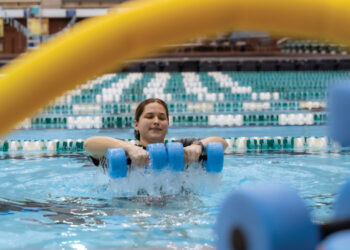Going off to college can be one of the most exciting times of your life. Moving away from home and having a newfound independence is exhilarating. No more curfews, cues to do homework and most importantly, reminders to eat balanced meals. Students arrive on campus and have access to a plethora of food options, not all healthy. And before they know it, the freshman 15 has become a reality. As campus recreation professionals, part of the job is to help promote healthy habits among the campus community, and this is not limited to sports and fitness programming. Offering nutrition and wellness options are a superb way to assist students in developing healthy lifestyles.
In early 2014, MIT Recreation launched a nutrition program to educate students on the importance of healthy eating and to provide tips for fitting fresh meals into their jam-packed schedules. “The students at MIT have pretty busy days and lots of little things make it really hard for them to follow a healthy diet,” said Kelsea Gusk, a registered dietitian for MIT Recreation. “A lot of the students I have worked with are really appreciative and find it helpful to sit down, go through their day and figure out where they are on campus and what are the options so they can make healthy eating choices.”
Recently, Gusk joined the MIT recreation team to provide nutritional counseling for the campus community. She is available for one-on-one counseling, as well as hosting workshops for various constituents on campus.
“We definitely saw a gap in nutritional programming on campus that was accessible to not only students, but also faculty and staff that wasn’t as clinical,” said Stephanie Smith, the associate director of recreation, programs and fitness. “Initially, to get the program kicked off, we started with free 15-minute consultations with Kelsea to get the ball rolling and get the word out.”
Prior to launching the new nutrition program, students needed a referral to meet with the campus nutritionist. “We thought for a lot of people that might be one obstacle too many,” explained Tim Mertz, the director of recreation at MIT. “We wanted low-barrier access, so to meet with Kelsea there is no referral necessary. She is open and available to all of our members.”
Since the program is a new addition to campus recreation, the biggest challenge has been getting the word out. Gusk explained they are still trying to figure out the best mode to reach people, whether it be social media, posters, events, etc.
“One of the pieces of marketing Kelsea put together was free webinars scheduled monthly and they are packed with information,” said Mertz. “Anyone can login for free and spend 20 minutes with Kelsea. She carries you through a really great presentation and each month has a different theme. Then at the end she engages in a Q&A. It is a really interesting and unique way to let campus know that this is a resource.”
So how can you go about launching a comprehensive nutrition program at your recreation center? According to Smith it is essential to collaborate with various departments on campus. “We really wanted to make the connections across campus,” she said. “We met with key stakeholders. We met with the clinical dietitian in our medical center, campus dining and then residential life folks. There are all of these different things now that students can access that they couldn’t before to help them find balance with their nutrition.”











